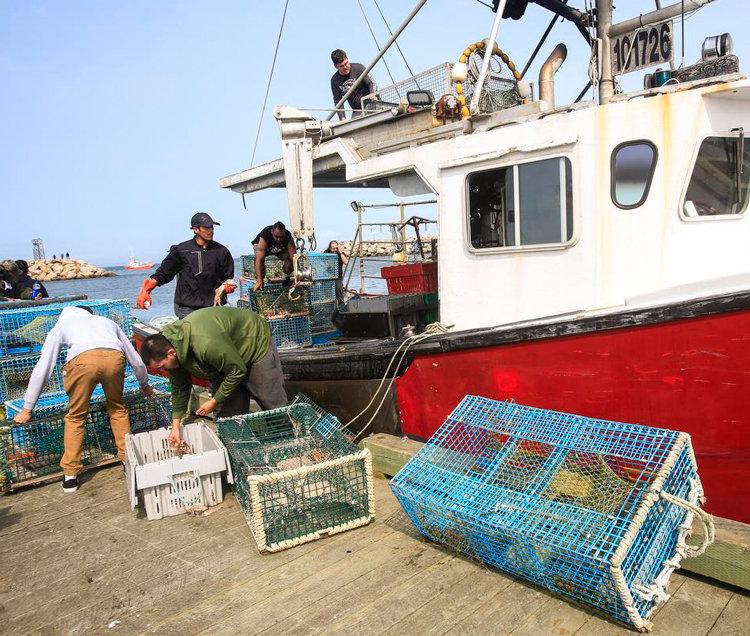MONTREAL — Overcoming divisions among exploited fishermen in the Maritime Provinces and defending Indigenous lobster fishermen from assault was the subject of a Militant Labor Forum here Oct. 23.
Native Mi’kmaq fishermen have condemned non-Indigenous fishermen for ransacking and incinerating their lobster pounds, cutting their lines and organizing flotillas aimed at intimidating them on the waters of St. Mary’s Bay in the last month.
Spokesmen for non-Indigenous fishermen denounced the attacks, but claim the Mi’kmaq’s fishing operations are threatening the conservation of lobster stocks and consequently their livelihoods.
The dispute follows the decision of the Sipekne’katik First Nation, which is the second largest Mi’kmaq band in Nova Scotia, to launch its own self-regulated commercial fishery in September outside the government-designated fishing season.
“The unions should demand that Ottawa act now to defend Mi’kmaq fishermen from attack,” Michel Dugré, a member of the Communist League, told the meeting. He described how the Royal Canadian Mounted Police did nothing to protect them.
“Labor needs to put forward demands that unite all fishermen with other working people in a struggle against our common enemy, this country’s capitalist rulers and their government.”
Dugré said the big-business media portray the dispute as a race war between fishermen. In fact both Indigenous and non-Indigenous working people are severely affected by the capitalist crisis.
“The large majority of fishermen, Indigenous and non-Indigenous, are exploited,” Dugré said, “by the fishing and distribution companies, the processing factories, and banks to which they are greatly indebted.”
The current dispute stems from a 1999 Supreme Court ruling that Natives have the right to catch fish outside the legal fishing season. However, the court also gave the government the power to limit their fishing to allow them only a “moderate living.” Ottawa then banned the Mi’kmaq from selling their catch. Cops routinely raided Mi’kmaq fishermen, seizing their lobster traps and equipment.
Eventually the government conceded that First Nation fishermen could develop their own commercial fishing fleets, but then last year insisted they comply with federal limits on the fishing season.
Ottawa’s system of issuing a limited number of lobster fishing licenses — that cost anywhere from $800,000 to $3 million for resale — combined with rising costs of production, make it harder for non-Native fishermen to make ends meet. Indigenous fishermen can’t afford to purchase licenses.
The buying and selling of licenses has concentrated their ownership into the hands of a small number of wealthy fishermen.
“Labor needs to put forward a perspective to unite exploited fishermen in a struggle to advance their common interests,” Dugré said. “It should demand that lobster fishermen be paid a price that guarantees an income high enough to meet their costs of production and ensure a decent living.” They also need cheap government credit to cover their substantial expenses for boats and equipment.
“Ottawa must end the system of lobster fishing licenses with full compensation to current owners for the cost of them,” Dugré said.
Oppressive legacy for Native people
As a result of historic discrimination, Native peoples earn much less on average than other Canadians, have higher rates of infant mortality and shorter life expectancy.
“Affirmative action to ensure jobs for Native people at union wages is central to overcoming the divisions among working people,” Dugré said. Alongside this, unions must demand that Ottawa fund a program of public works to create jobs for the millions of unemployed.
A rally in support of the Mi’kmaq fishermen drew 1,000 people in Halifax, Nova Scotia, Oct. 18. Other actions were held in Toronto and Vancouver.
“The problem Indigenous people face is not ‘systemic racism’ as middle class radicals argue,” Dugré told the forum. There isn’t a rise in anti-Native sentiment among working people, but sharpening competition among exploited producers that is the source of the recent conflicts.
“By waging a struggle against the capitalist rulers and their government,” Dugré concluded, “working people can lay the basis to build our own party, a labor party, that can lead a mass movement of millions to establish a workers and farmers government.”


